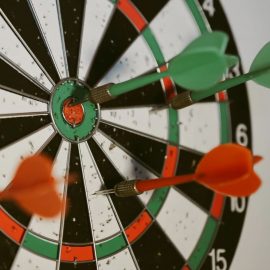

This article is an excerpt from the Shortform book guide to "Secrets of the Millionaire Mind" by T. Harv Eker. Shortform has the world's best summaries and analyses of books you should be reading.
Like this article? Sign up for a free trial here .
What is the financial setpoint? Why do the poor stay poor and the rich stay rich?
One of the main reasons poor people stay poor is because they lack money management skills. Even when a huge sum of money lands in their lap (e.g. through lottery or inheritance), people often end up broke within a few years. According to T. Harv Eker, the author of Secrets of the Millionaire Mind, the reason for this is their “financial setpoint.”
Keep reading to learn how one’s financial setpoint—the amount of money they feel they can comfortably manage—keep poor people poor and rich people rich.
Your Financial Setpoint
Your money mindset includes all of the beliefs about money that you accumulated throughout your childhood. Eker claims that these beliefs also include a conclusion about the amount of money you trust yourself to manage effectively. This amount defines your capacity for wealth—we’ll refer to this as your “financial setpoint.”
- There are various analogies you can use to visualize this setpoint. For example, think of it as a cup that can only hold so much water. This cup is your capacity for wealth.
Your money mindset creates specific results that align with your financial setpoint: It programs you to think and behave in specific ways to create results that conform to your unconscious beliefs about how much money you can manage. Even if you manage to earn money past this amount, you won’t be able to hold onto it for long. This is because your money mindset operates from the belief that you can’t handle the challenges that come with managing more money. In other words, your money mindset ensures that your finances always reflect your financial setpoint.
| Why Would You Limit Your Financial Setpoint? Throughout the book, Eker very briefly touches on concepts such as the law of attraction and the role your subconscious plays in guiding your thoughts and actions to match your financial setpoint. But he doesn’t explain exactly why you would limit yourself by setting a low financial setpoint. Therefore, we’ll refer to research based on the psychology of success to provide some insight into why your financial setpoint is where it is. According to Maltz (Psycho-Cybernetics), you developed limiting beliefs as a way to protect yourself from emotionally uncomfortable (unsafe) situations—the way you identified with the uncomfortable situation led you to feel unwanted negative emotions. You reacted by forming a conclusion about what led to this discomfort and you made the decision to avoid similar situations and protect yourself from future discomfort. Your mind stored this decision as a belief. Even though you’re not conscious of this belief, it continues to impact your thoughts, feelings, and behaviors. For example, your parents worked hard for their money and didn’t have a lot of time for you. Every time they achieved a level of comfort around their finances, friends and family members would ask for handouts. Your parents always gave their money to those who asked. They continued to work hard and rarely spent any money on themselves or made time to enjoy themselves. You observed all of this and felt uncomfortable. You resented your parents for working so hard and having so little time for you. You resented them for prioritizing the needs of others. You also resented all of the people that took advantage of your parents. These feelings of resentment led you to associate having money with being taken advantage of, and you decided that you would never let yourself get treated that way. This turned into a belief and created your financial setpoint: If you have over $X you’ll get taken advantage of, so it’s safer to never have more than that amount. |
The Poor Stay Poor While the Rich Stay Rich
Eker explains that financial setpoints are why the poor stay poor and the rich stay rich. Different people can comfortably manage different amounts of money depending on their financial setpoint. Some people only feel comfortable managing small amounts of money, while others can comfortably manage millions of dollars.
Eker claims that lottery winners always end up losing their winnings due to their low financial setpoint—according to Eker, generally, only poor people play the lottery, hence his assumption that lottery winners have a low financial setpoint. They only feel comfortable managing a small amount of money, so they inevitably spend all of their winnings to return to an amount of money that they’re comfortable with.
(Shortform note: According to statistics, 70% of lottery winners lose all of their money and are more likely to declare bankruptcy within 3-5 years after they collect their winnings. However, it’s not as black and white as Eker makes out—some lottery winners manage to hold onto their winnings and use the money to make a positive difference in their communities. For example, one high school teacher used his winnings to set up a summer camp for kids—he invested his money in a way that benefited his community and also created ongoing income.)
On the other hand, a number of self-made millionaires have lost all of their money only to get it all back again. According to Eker, they feel extremely uncomfortable when their finances fall below their financial setpoint. As a result, their programming leads them to take proactive action to earn the money that they’re accustomed to having so that they can feel comfortable.
(Shortform note: While Eker’s claim that multi-millionaires often fight back to regain the money they lose does seem to be the norm, a number of wealthy people have lost all of their money and never made it back. For example, when Allen Stanford was convicted of fraud in 2008, he lost his entire fortune ($2.2 billion). He’s currently serving a 110-year sentence, so it’s unlikely that he’ll ever make this money back again.)
While you may think your balance hovers around the same amount due to external factors (financial emergencies, necessary supplies you had to buy), Eker believes that your financial setpoint is the only factor that determines your bank balance.
(Shortform note: Eker’s claim that external factors don’t determine your bank balance may come across as reductive when you consider the higher costs of living that low-income households face. For example, for people living in poor neighborhoods, auto insurance companies charge 30% extra while home insurance companies increase their fees by 150%. Further, some predatory loan providers target low-income earners by offering small loans with extortionate interest rates (up to 400%). These external factors all contribute to your bank balance and impact your ability to grow your finances.)

———End of Preview———
Like what you just read? Read the rest of the world's best book summary and analysis of T. Harv Eker's "Secrets of the Millionaire Mind" at Shortform .
Here's what you'll find in our full Secrets of the Millionaire Mind summary :
- The difference between the way rich people and poor people think and feel about money
- How to improve your finances by taking conscious control of your thoughts
- Why you may be holding yourself back from becoming wealthy






